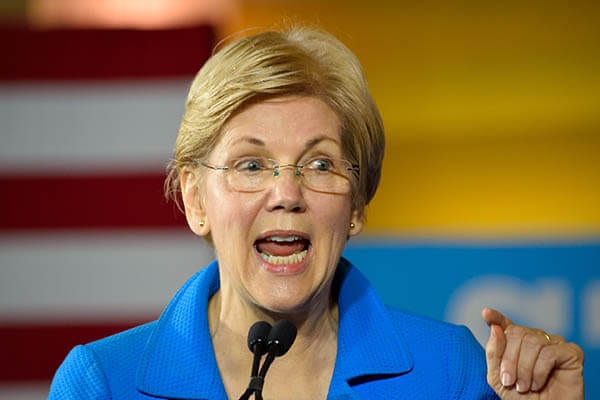Democratic Presidential Candidates Plan to End Student Debt Crisis
It’s impossible not to notice that student loan debt has emerged as a big issue in the campaigns for the 2020 Democratic Party presidential nominations.
Massachusetts Sen. Elizabeth Warren brought it to the forefront in the spring of 2019 when she proposed a plan to forgive a large portion of the more than $1.5 trillion owed by student borrowers.
In June, Vermont Sen. Bernie Sanders proposed the most sweeping plan yet, asking that all student loans be forgiven and there be no tuition for public colleges. Former Department of Housing and Urban Development Secretary Julian Castro has proposals of his own, and it’s likely that the 20 or so other Democratic candidates will be bringing forth their own ideas.
How the Student Loan Crisis Started
A lot of decisions contributed to the student loan crisis, not all of them by the students.
Tuition and fees rose at triple the rate of inflation between 2007 and 2018, in part because the financial crisis a decade ago let state governments to cut funding for higher education. For many graduates, wages didn’t keep pace with the increased cost of a degree.
This is particularly true at for-profit universities, said Rajesh Narayanan, chair of the Finance Department at Louisiana State University’s E.J. Ourso College of Business. A 2018 Brookings Institution report noted that 52% of borrows who attended a for-profit college in 2003 defaulted on their loans after 12 years, and its 20-year forecast is that up to 70% of those borrowers might default by 2023.
Economic ignorance on the part of borrowers who racked up large debts while entering careers unlikely to provide incomes needed to pay off that debt is an unmeasurable factor.
Proposed Student Debt Relief Plans
Warren’s announced plan would cancel up to $50,000 of debt for those in households making less than $100,000 per year and decrease debt by $1 for every $3 that households earn above $100,000. Someone earning $130,000 would be eligible to have $40,000 of student debt cancelled.
There would be no debt cancellation to people with household income above $250,000. Her proposal also would prevent taxing the canceled debt as income. Warren claims that 75% of people with student-loan debt would have it canceled and 95% would see some relief.
Warren proposes paying for this with a wealth tax of 2% on personal net worth over $50 million dollars and 3% on net worth over $1 billion. The vast majority of the canceled debt is owned by the federal government.
Sanders’ plan, announced more recently, goes even bigger. It would eliminate every penny of student debt, no matter how affluent the family, including the roughly $100 billion owed to private lenders. He proposes paying for it with a tax on Wall Street he says will raise $2.4 trillion over 10 years.
Both Sanders and Warren also propose eliminating tuition at all public colleges and universities.
Economic Impact of Student Debt Relief
How these plans might affect the economy depends on whom you ask. The Levy Economics Institute at Bard College estimated that eliminating student debt could raise the GDP by almost $1.1 trillion over the next decade, create up to 1.5 million new jobs per year and lower the unemployment rate up to 0.36 percentage points over a decade.
Narayanan isn’t sure it’s necessary.
“The U.S. economy is already doing reasonably well. Unemployment is pretty darned low,” he said. “I’m skeptical.”
Concerns Over Student Debt Relief
Separating economic concerns from political opinions is tricky with anything proposed by politicians, especially those running for president.
One worry is what economists call moral hazard – people take more risks when someone else bears the costs of those risks. If the federal government wipes out a significant part or all of the current student loan debt, it’s easy for future students to conclude that any borrowing they do for higher education will be treated the same way, creating a problem down the road, Narayanan said.
“The broad view is that debt forgiveness is good for perhaps certain levels of socio-economic groups, but I think most people would argue it doesn’t make sense to do it across the board because it would engender moral hazard,” Narayanan said.
Narayanan alludes to another, more political concern: Paying off most or all student loans would be an enormous transfer of wealth to people who already are earning higher incomes because they went to college. He notes that Warren’s plan, unlike Sanders’, has an earnings cap but suggests it may be too high. He’d like a more targeted debt forgiveness plan, plus more thought about those who could benefit from college.
“Who do we want to make this education most accessible to? I think you want to make it most accessible to the most vulnerable socio-economic group,” he said. “We still have a lot of families at $40,000 of income. Why don’t we start with people who are at the poverty line?
“Notice, we are addressing a problem of people who elected to go to college when the larger problem seems to be … we still have a lot of people who are not going to college. There is a skills gap in the economy. I would target it toward subsidizing education for people to get skills with which they can operate in the state of the economy that we are in.”
Student Loan Crisis: A Growing Problem
Borrowers owe $1.57 trillion at the start of 2019, and it’s held by more than 42 million borrowers, according to the U.S Department of Education. Borrowing has ballooned by more than 300% in the past decade and the average debt held by a graduate is over $37,0000, though some have many times that amount.
Of course, people borrow money for all sorts of reasons. In this case, it’s to pay for the cost of higher education, which typically leads to higher-paying careers that should afford graduates the ability to pay off their debts and live more affluent lives.
The problem is the student loan debt is eating up much of their income and unlike other loans, it cannot be eliminated through bankruptcy.
All this is a problem for the debtors individually, and some economists are concerned it has become a drag on the economy. Debt-holders may delay buying homes, cars and other big-ticket items, getting married or starting retirement funds, as well as paying off other debts.
A Bankrate survey of college graduates published this year found that 73% of respondents had put off “at least one major life milestone” due to student debt.
Sources:
- Rosenberg, Y. (2019, June 24) Bernie Sanders Goes Big on Student Debt Forgiveness. Retrieved from https://finance.yahoo.com/news/bernie-sanders-goes-big-student-221730045.html
- N.A. (2019, April 30) Student loan debt crisis: How did we get here? Retrieved from https://www.cbsnews.com/news/student-loan-debt-crisis-how-did-we-get-here/
- Mulhere, K. (2018, January 12) For-Profit College Students Are Defaulting on Their Loans at an Alarming Rate. Retrieved from http://money.com/money/5099019/for-profit-college-student-loan-default/
- Bursztynsky, J. (2019, March 1) More people put off home buying, due to student debt: Survey. Retrieved from https://www.cnbc.com/2019/03/01/suvery-finds-more-people-put-off-home-buying-due-to-student-debt.html
- Muresianu, A. (2019, June 3). Elizabeth Warren's Budget Math Still Doesn't Work. Retrieved from https://reason.com/2019/06/03/elizabeth-warrens-budget-math-still-doesnt-work/
- Tompor, S. (2019, April 24). Elizabeth Warren's plan for student loan forgiveness: Don't bank on it. Retrieved from https://www.freep.com/story/money/personal-finance/susan-tompor/2019/04/24/elizabeth-warren-college-debt-plan/3549230002/
- Picchi, A. (2019, April 23). Elizabeth Warren's student debt relief plan: Could it super-charge the economy? Retrieved from https://www.cbsnews.com/news/elizabeth-warren-student-debt-relief-plan-could-it-super-charge-the-economy/
- Gray, S. (2019, April 27) Elizabeth Warren's plan to forgive student-loan debt is costly, but it could actually pour money into the US economy. Retrieved from https://www.businessinsider.com/student-loan-debt-forgiveness-elizabeth-warren-economic-impacts-2020-election-2019-4


















